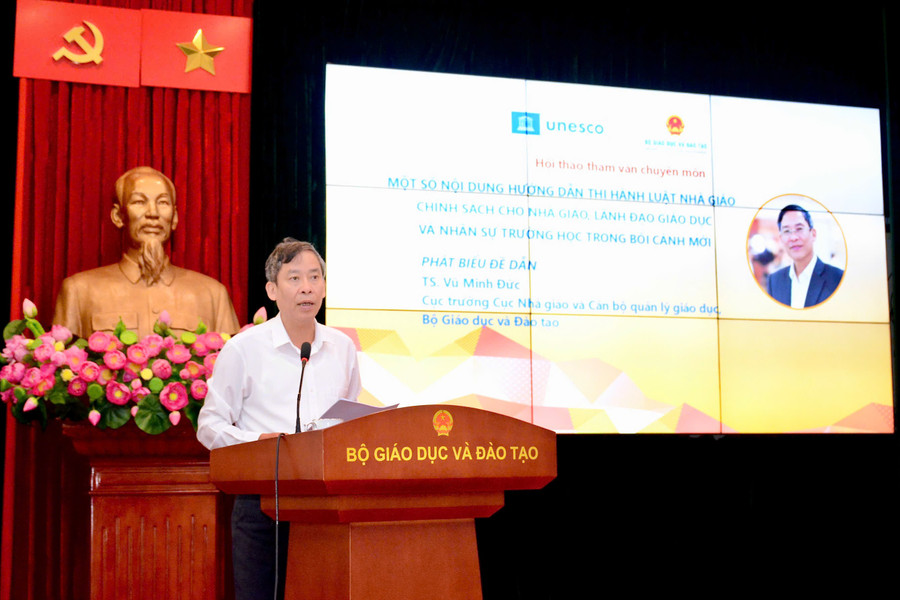The above information was informed by Mr. Vu Minh Duc - Director of the Department of Teachers and Educational Managers, Ministry of Education and Training at the Workshop on professional consultation on a number of contents guiding the implementation of the Law on Teachers, policies for teachers, educational leaders and school personnel in the new context on the morning of July 17.
The workshop was organized by the Ministry of Education and Training in coordination with UNESCO.
For the first time in history, there is a separate law for teachers
Mr. Duc said that on June 16, at the 9th session, the 15th National Assembly passed the Law on Teachers with 9 chapters and 42 Articles. This is an important milestone, of great significance not only to the entire teaching staff, to the education sector but also to the entire Vietnamese nation.
For the first time in history, the National Assembly issued a separate law fully regulating the position, role, rights, obligations and regimes and policies for the teaching staff; concretizing the major policy of the Party and State in honoring, caring for, protecting and developing the teaching staff - the key force of the education sector.

Mr. Vu Minh Duc emphasized 5 notable highlights in the provisions of the Law on Teachers, including:
First, affirming the position, protecting the honor and prestige of the teaching profession.
Second, teachers' salaries are ranked highest in the administrative career salary scale system.
Third, some policies on better treatment, support and attraction for teachers.
Fourth, standardize and develop the team - improve the quality of education.
Fifth, increase autonomy for educational institutions and give the education sector the initiative.
The Government will issue 3 Decrees and issue 12 Circulars under its authority
To ensure the effectiveness of the Law on Teachers from January 1, 2026, Mr. Duc said that the Ministry of Education and Training must advise and submit to the Government to issue 3 Decrees and issue 12 Circulars under its authority.
3 Decrees include: Decree detailing a number of articles of the Law on Teachers; Decree regulating salary policies, allowance regimes, support and attraction policies for teachers; Decree regulating preferential allowances according to the profession for civil servants in the education sector.
12 Circulars regulating professional standards, working regimes, recruitment authority, equivalent titles, and codes of conduct for teachers.
In addition, the Ministry of National Defense and the Ministry of Public Security must also study and develop Circulars regulating working regimes and professional standards for teachers under their management authority.
According to the Director of the Department of Teachers and Educational Managers, completing the above number of documents within 6 months with limited resources for the implementation team is one of the major difficulties and challenges for the Ministry of Education and Training.
At the same time, the implementation of the policy of building a two-level local government, along with changes in the current legal system related to the organization of local government, management of civil servants, etc., has a great impact on regulations on the recruitment, use, and management of teachers, requiring the construction process to be continuously updated, ensuring consistency with related changes in the legal system.
Along with that, at present, the Ministry of Education and Training is simultaneously implementing amendments and supplements to 3 Laws including: Law on Education, Law on Higher Education and Law on Vocational Education.
In the above 3 Laws, issues related to all educational personnel in schools, including teachers, educational institution managers, educational managers, and staff are of interest, amended and supplemented to ensure compliance with the Law on Teachers, while meeting new requirements.











